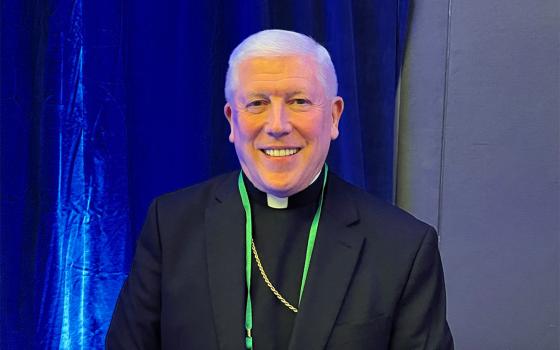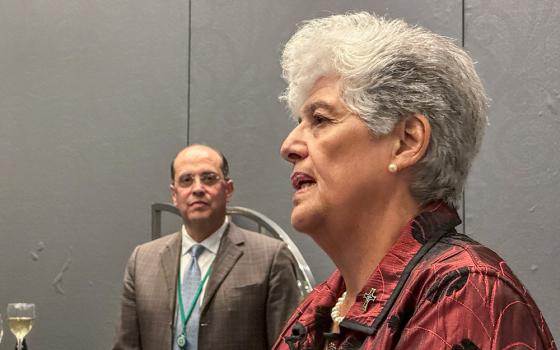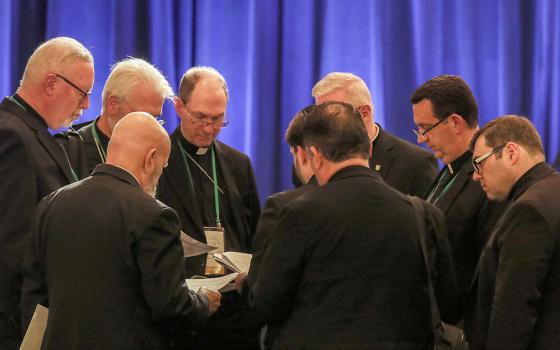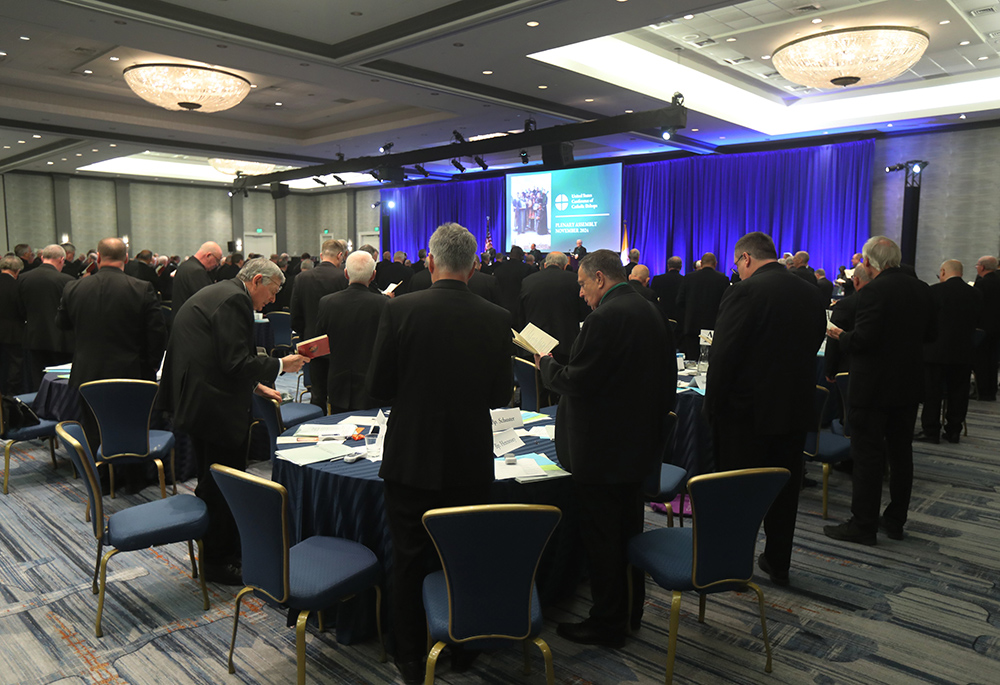
Prelates pray during a Nov. 12 session of the fall general assembly of the U.S. Conference of Catholic Bishops in Baltimore. (OSV News/Bob Roller)
The elections for conference treasurer and committee chairs at this year's U.S. bishops' conference meeting constituted a rejection of some of the more arch-conservative candidates in favor of more centrist, or at least center-right, bishops.
In two contests, bishops most associated with the culture warrior-wing lost, and in the other four contests, the bishops selected candidates whose pastoral credentials are more obvious than any ideological preferences.
Discerning the tea leaves at a bishops' conference meeting is never easy but contests for committee chairs and leadership positions are one of the few means to gauge the direction the conference wants to take as a whole. The votes are taken in public but are conducted by secret ballot, so bishops needn't feel pressure to conform and the rest of us get to see the results in real time.
Like all elections, there is what political scientists call "noise" that obscures receiving a clear signal. For example, if an eparch from an Eastern-rite church is a candidate, he is likely to receive the support of the other Eastern-rite bishops. Bishops who belong to religious orders also tend to support one another. Archbishops tend to win over bishops, and ordinaries tend to win over auxiliaries.
At all times, relationships, some of which date back to friendship in seminary or graduate school, especially among those who attended the North American College in Rome, matter more than ideologies.
Advertisement
In the contest for conference treasurer, Archbishop Bernard Hebda of St. Paul and Minneapolis soundly defeated Bishop David Malloy of Rockford, Illinois, by a vote of 156-84.
Some of the older bishops remember when then-Monsignor David Malloy was elected general-secretary of the conference in 2005. That was the first domino to fall in the long-term effort to wrest control of the conference from the group of bishops and clergy formed by the vision of Cardinal Joseph Bernardin, men who were deeply committed to both collegiality among the bishops and to a conference that was engaged in the life of the nation across a range of issues. Malloy represented a different path, more deferential to Roman authorities (it was 2005, not 2015!) and ambitious to focus more on abortion than on other issues of public significance.
Archbishop Bernard Hebda is both a canon and a civil lawyer, which is to say that he is trained to see both sides of an argument. Canon lawyers tell me he is one of the best: smart as a whip, strong work ethic and likable. He has served in four different ecclesiastical provinces: a priest in Pittsburgh, a bishop in Gaylord, Michigan, a coadjutor archbishop in Newark, New Jersey, and now as archbishop in Minnesota, so a lot of other bishops have gotten to know him. He is not associated with any "camp" as far as I can tell. His significant win can be interpreted as a vote against ideology.
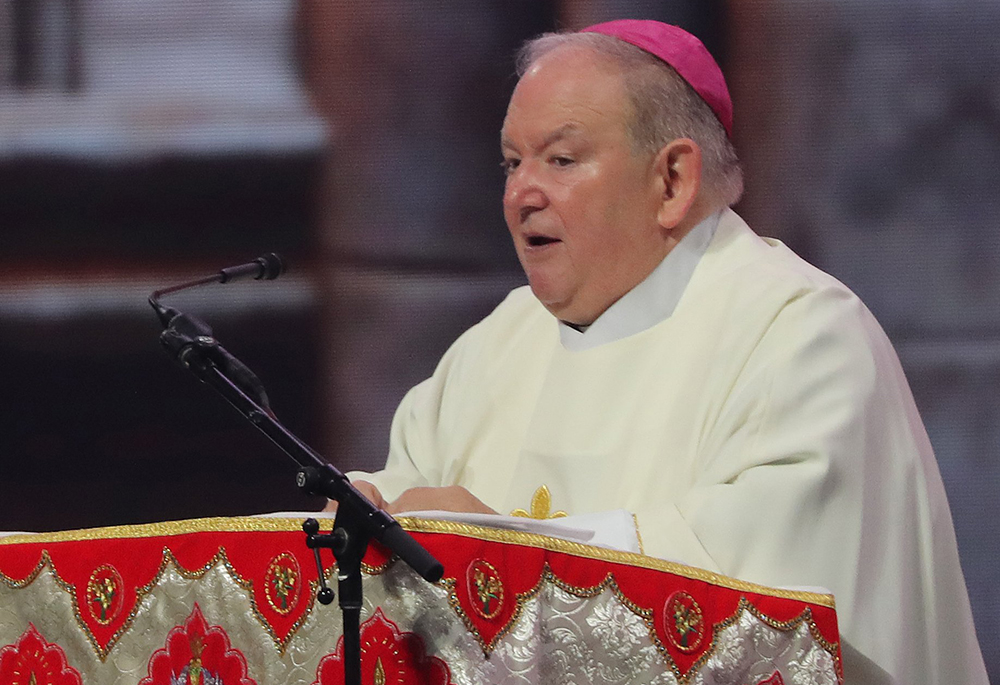
Archbishop Bernard Hebda of St. Paul and Minneapolis helps lead a morning prayer session of the family rosary July 20, prior to Holy Qurbana at Lucas Oil Stadium in Indianapolis during the National Eucharistic Congress. Holy Qurbana is the name for Mass in the Catholic Church's Syro-Malabar rite. (OSV News/Bob Roller)
In other contests, the candidate most associated with the church's more conservative wing lost and lost handily.
Archbishop Alexander Sample of Portland, Oregon was a candidate to lead the Committee on Divine Worship but his longstanding affinity for the pre-Vatican II rite was a bridge too far for the rest of the bishops. He lost to Bishop Michael Woost, auxiliary bishop of Cleveland, by a vote of 112-128, the closest margin. Woost has only been a bishop for two years so his victory can only be interpreted as a rejection of Sample.
Bishop Ronald Hicks of Joliet, Illinois was chosen handily to lead the Committee on Clergy, Consecrated Life, and Vocations, defeating Bishop Juan Miguel Betancourt, auxiliary bishop of Hartford, Connecticut, by 146-94. Hicks is a rising star in the conference, having worked closely with then-Fr. Robert Barron at St. Mary of the Lake Seminary in Mundelein, Illinois, one of the nation's largest seminaries.
Bishop James Conley of Lincoln, Nebraska, is one of the most conservative bishops in the country, and he lost the contest to become chairman of the Committee on Laity, Marriage, Family Life and Youth, garnering only 91 votes to 147 for Dallas Bishop Edward Burns. Conley is a protégé of retired Archbishop Charles Chaput, to whom Conley paid tribute in a recent article at the National Catholic Register. No bishop has done more to embroil the Catholic Church in the culture wars than Chaput. Burns, like Hebda, a priest of the diocese of Pittsburgh, is no liberal, but this election result was clearly a vote to move away from the culture war approach.
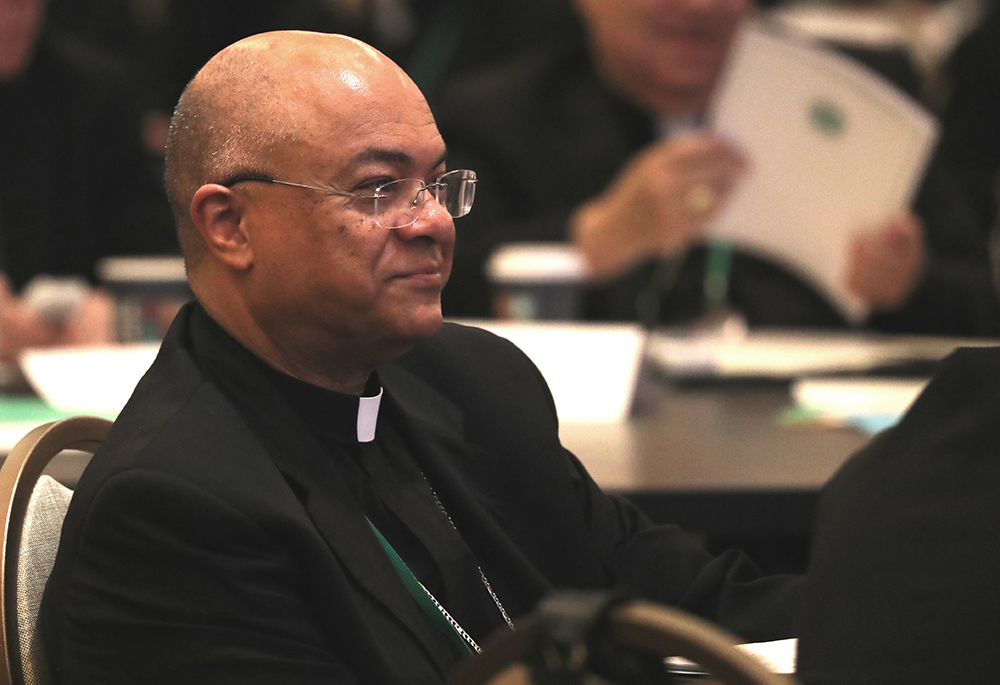
Archbishop Shelton Fabre of Louisville, Kentucky, smiles June 14 at the U.S. Conference of Catholic Bishops' Spring Plenary Assembly in Louisville. (OSV News/Bob Roller)
The highest vote getter of the day was Archbishop Sheldon Fabre of Louisville, Kentucky, who defeated Bishop Kevin Sweeney of Paterson, New Jersey, by a vote of 158-81. The archbishop will become the chairman of the Committee on Domestic Justice and Human Development. Fabre is a brilliant, soft-spoken man who shepherded the drafting of the 2018 bishops' statement on racism. I was in Louisville in 2023 when Fabre presided over an interfaith prayer service at the Cathedral of the Assumption after a mass shooting event, and his opening and closing prayers were ecumenical in the best sense, inclusive of the interfaith community but also distinctly Catholic in tone and content.
There are no tea leaves in the results for the election of a new chair of the Committee on Migration. The bishops chose Bishop Brendan Cahill of Victoria, Texas, over Bishop Joseph Tyson of Yakima, Washington, by 155 votes to 85. Given the mounting fears about possible "mass deportations" and other anti-immigrant activities the Trump administration may enact, the bishops voted for a bishop closer to the border.
Do these results indicate a shift to Team Francis? Not exactly. But they do represent a repudiation of the episcopal equivalent of the alt-right. Sample and Conley are champions of a more extreme, culture warrior agenda — along with San Francisco Archbishop Salvatore Cordileone who got trounced last year when the bishops' conference selected a new chair of the Committee on Pro-Life Activities. The bishops' conference remains decidedly right-of-center, and there is still an inability or unwillingness to really engage Pope Francis' agenda on the part of many bishops. Still, the first step towards finding a new center is to shed the extremes. There is no one on the extreme left at a meeting of bishops, but the body as a whole decided to shed its extreme right. That's progress.





